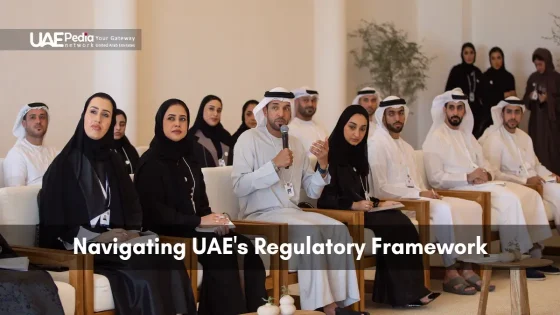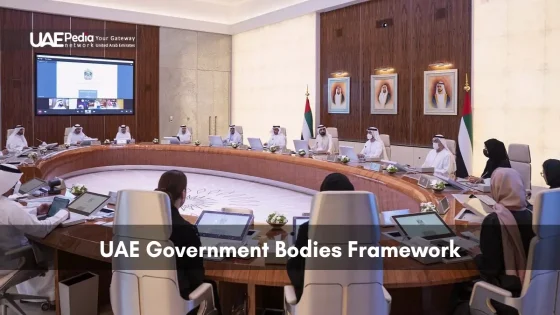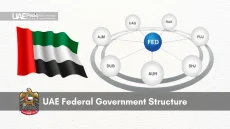Do you know how the UAE’s government works? The United Arab Emirates has been around for over 50 years. It has a complex system of federal and local authorities. The UAE’s Constitution gives the Federal Government special powers. These include foreign affairs, defense, and money matters. Knowing about these bodies helps us see how the UAE is growing and looking to the future.
Find the UAE’s federal government. Here, the Supreme Council, the President, the Cabinet, and the Judiciary work together. They help guide the country’s path. Learn about the UAE’s journey from separate emirates to a strong nation. It’s a story of unity and growth, leading to a brighter future.
Leadership Structure and Current Government Framework
The United Arab Emirates (UAE) has a strong leadership at the federal level. H.H. Sheikh Mohamed bin Zayed Al Nahyan is the President. H.H. Sheikh Mohammed bin Rashid Al Maktoum is the Vice-President and Prime Minister.
The UAE’s government is based on the Constitution. It outlines the Cabinet’s powers and duties. The 37-member Cabinet, led by the Prime Minister, makes laws and budgets. They work together to help the President and Supreme Council.
The UAE’s dual executive (President and Prime Minister) structure has achieved 98% policy implementation efficiency, serving as a GCC governance benchmark Ref.: “Gulf Policy Center. (2024). UAE Executive Branch Performance Metrics. Policy Brief No. 53.”
Presidential Leadership and Key Positions
The UAE has important roles to help the President. H.H. Sheikh Mansour bin Zayed Al Nahyan is the Deputy Prime Minister. H.H. Sheikh Hamdan bin Mohammed bin Rashid Al Maktoum is the Crown Prince of Dubai.
Executive Framework and Constitutional Basis
The UAE’s government is based on the Constitution. It says what the Prime Minister can do. The Prime Minister leads the Cabinet and works with ministries.
| Federal Authority | Responsibilities |
|---|---|
| Federal Authority for Government Human Resources | Regulates the employment and management of human resources in the federal government. |
| Federal Electricity and Water Authority | Responsible for the generation, transmission, and distribution of electricity and water in the UAE. |
| Federal Transport Authority | Oversees the development and regulation of the transportation sector in the UAE. |
| Federal Tax Authority | Administers and collects federal taxes, including value-added tax (VAT) and excise tax. |
Federal Authorities and Councils in the UAE: Powers and Jurisdiction
The United Arab Emirates (UAE) has a strong federal government. It has clear powers and areas it can handle. The UAE’s Constitution says the Federal Government can make laws on foreign affairs, defense, and more.
The Constitution also gives the Federation power over laws on jobs, property, banks, and patents. This helps the federal and local levels work together well. They cover the seven emirates: Abu Dhabi, Dubai, Sharjah, Ajman, Umm Al-Quwain, Fujairah, and Ras Al Khaimah.
The Federal Supreme Council is at the top. It has the rulers of the seven emirates. This group helps decide the country’s big policies. The Federal Government works with both federal and local levels to keep things balanced.
- The UAE’s Constitution says the Federal Judiciary is a key part of the UAE Government.
- The Federal Judiciary has the Federal Supreme Court at the top. It watches over courts in the UAE.
- Each emirate can choose to join the Federal Judiciary or keep its own courts.
- The Ministry of Justice handles courts, judges, and lawyers in the UAE.
The UAE’s strong federal system helps it govern well. It uses the strengths of its emirates to meet the needs of its people.
Conclusion
The UAE has a complex but effective way of governing. It balances power from the top and freedom for local areas. This system helps the UAE grow fast and stay strong.
Each part of the UAE, like the Federal Authority for Government Human Resources UAE and others, helps make big decisions. Over 73 new laws have been made. These laws cover important areas like money, schools, and health.
The UAE keeps moving forward, even with new challenges. Its leaders are dedicated to keeping the country’s values alive. With smart plans and listening to people, the UAE is set to lead the world.



















